Kaiser Permanente's innovative mental health initiatives in Aurora, focusing on the RFM (Recall, Feedback, Motivation) model, empower individuals through resilience training, mindfulness meditation, and open discussions. These programs reduce mental illness stigma, improve access to care, and enhance overall well-being, as reflected in favorable Kaiser Permanente mental health center reviews from Aurora residents, revolutionizing mental healthcare with inclusive practices.
Resilience is a vital component of mental well-being, especially in today’s fast-paced world. This article explores the implementation of RFM (Resilience, Flexibility, and Mastery) exercises, highlighting their potential to enhance community wellness. We delve into how organizations like the Kaiser Permanente Mental Health Center in Aurora have successfully integrated these practices. By examining case studies and best practices, we provide insights on effective resilience training programs and methods for evaluating their impact, offering a comprehensive guide for promoting psychological agility and adaptability.
- Understanding RFM: A Key Metric for Resilience Building
- Kaiser Permanente Mental Health Center Reviews: Aurora's Approach
- The Role of Resilience Exercises in Community Wellness
- Implementing Effective Resilience Training Programs
- Measuring Success: Evaluating the Impact of RFM Initiatives
Understanding RFM: A Key Metric for Resilience Building

Resilience is a vital asset for individuals to navigate life’s challenges and maintain overall mental wellness. This is where the RFM (Recall, Feedback, Motivation) model steps in as a powerful tool, particularly in the context of mental health initiatives, such as those offered by Kaiser Permanente mental health centers in Aurora. By utilizing this metric, mental health professionals can gain valuable insights into an individual’s emotional and psychological state, which is essential for tailoring effective interventions.
The RFM approach encourages individuals to reflect on their past experiences (Recall), share their feelings and perspectives through feedback mechanisms, and find sources of motivation to embrace positive changes. For example, Anxiety Relief workshops or Stress Management Programs within the organization can incorporate journaling exercises as a Recall component, allowing participants to document and process their stressful events. Feedback sessions then facilitate open discussions, fostering a sense of community and shared understanding. This structured guidance encourages individuals to explore coping strategies and personal growth opportunities, ultimately enhancing mental wellness as evidenced by numerous Kaiser Permanente mental health center reviews Aurora residents have shared.
Kaiser Permanente Mental Health Center Reviews: Aurora's Approach

The Kaiser Permanente Mental Health Center in Aurora has garnered recognition for its innovative approach to resilience-building exercises and community outreach programs. Their comprehensive strategy involves integrating mental health policy analysis and advocacy into their core practices, which has significantly contributed to reducing the stigma associated with mental illness. The center’s reviews highlight successful initiatives that foster a supportive environment, empowering individuals to take charge of their mental well-being.
By implementing these strategies, the Aurora location has created a holistic system that addresses mental health concerns within the community. Their efforts have not only improved access to care but also encouraged open conversations about mental illness, leading to increased awareness and understanding. These positive changes underscore the center’s commitment to revolutionizing mental healthcare through inclusive practices and dedicated advocacy.
The Role of Resilience Exercises in Community Wellness

Resilience exercises play a pivotal role in fostering community wellness, as highlighted by various initiatives at Kaiser Permanente mental health centers, such as those in Aurora. These practices are designed to empower individuals and communities to bounce back from challenges, whether they be physical, emotional, or social. By integrating activities like mindfulness meditation into daily routines, residents can enhance their Mental Health Awareness and overall well-being.
The implementation of resilience-building programs in community settings goes beyond individual benefit; it creates a collective effect. When a group engages in exercises that promote mental fortitude, it strengthens the social fabric and fosters a supportive environment. This is especially pertinent in light of the Risk Assessment for Mental Health Professionals, emphasizing the need for robust strategies to safeguard the well-being of those dedicated to providing mental health services.
Implementing Effective Resilience Training Programs

Implementing effective resilience training programs is a proactive approach that empowers individuals to navigate life’s challenges with greater equanimity. At Kaiser Permanente mental health centers, such as those in Aurora, these initiatives have gained significant traction. The key lies in tailored exercises that foster self-awareness and emotional intelligence, enabling folks to recognize and manage their responses to stress, anxiety, or trauma. By integrating activities like mindfulness meditation, cognitive reframing techniques, and social support networks, mental health professionals facilitate a holistic transformation.
This approach not only bolsters individual resilience but also contributes to broader Mental Illness Stigma Reduction Efforts. Through regular Stress Management Workshops Organization sessions, participants learn to view setbacks as opportunities for growth rather than defining moments that dictate their futures. Incorporating these programs into daily life can revolutionize how individuals cope with adversity, leading to indelible personal metamorphosis and improved well-being, as evidenced by many positive Kaiser Permanente mental health center reviews Aurora.
Measuring Success: Evaluating the Impact of RFM Initiatives

Measuring success is a vital step in evaluating the effectiveness of RFM initiatives, especially at institutions like Kaiser Permanente mental health centers in Aurora. By implementing resilience-building exercises and Compassion Cultivation Practices, these centers aim to enhance clients’ coping mechanisms and overall well-being. The impact of such programs can be assessed through various means, including client feedback and mental health assessments.
Regular reviews and feedback from participants play a crucial role in gauging success. For instance, at Kaiser Permanente, mental health center reviews highlight improvements in mood management and confidence-boosting among clients who have undergone RFM training. These qualitative insights, coupled with quantitative data from standardized mental health measures, provide a comprehensive evaluation of the program’s impact. Such evaluations ensure that the initiatives are not only reaching their intended audience but also making a tangible difference in people’s lives, as evidenced by the positive Kaiser Permanente mental health center reviews Aurora has received.
Resilience is a powerful tool for personal and community growth, as evidenced by the success of initiatives like those reviewed from the Kaiser Permanente Mental Health Center in Aurora. By implementing resilience-focused programs and exercises, such as those discussed in this article, individuals can enhance their mental well-being and communities can foster a more robust support system. The RFM (Resilience, Flexibility, and Mindfulness) framework, when effectively measured and evaluated through initiatives like those at Kaiser Permanente, offers a comprehensive approach to building resilience. This, in turn, can lead to improved mental health outcomes and enhanced overall community wellness.






